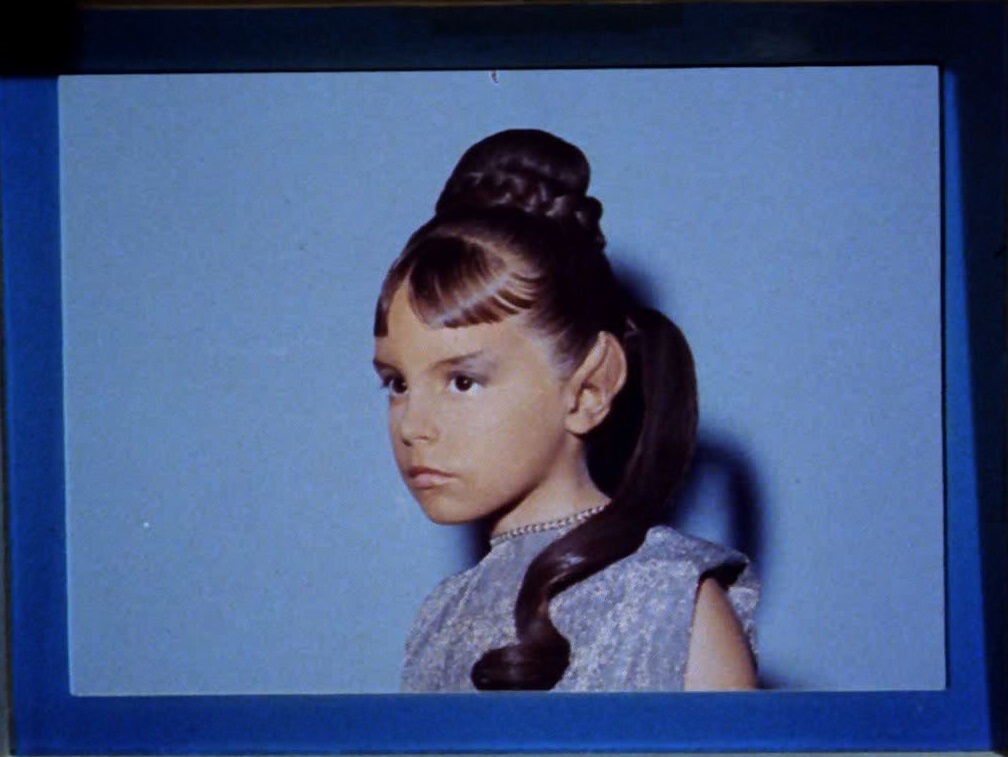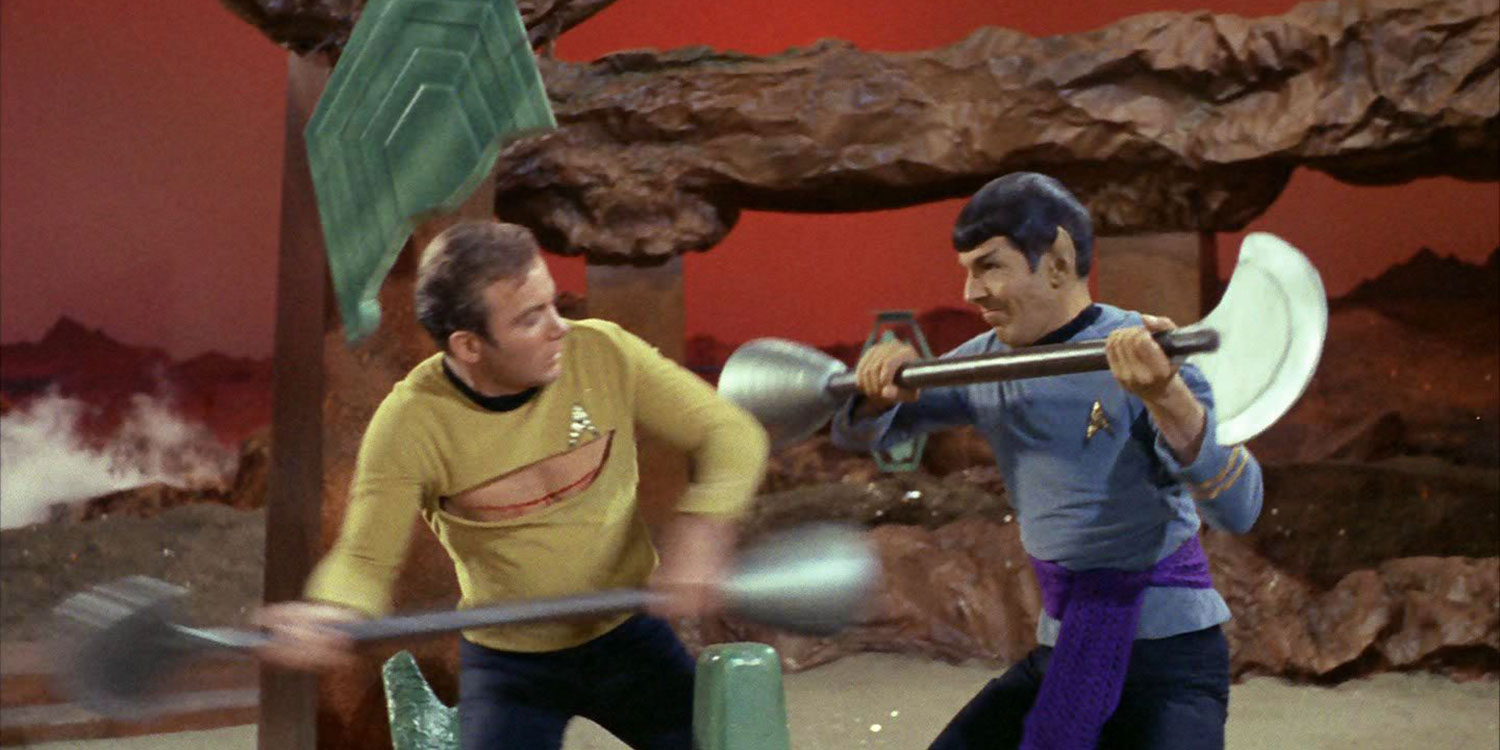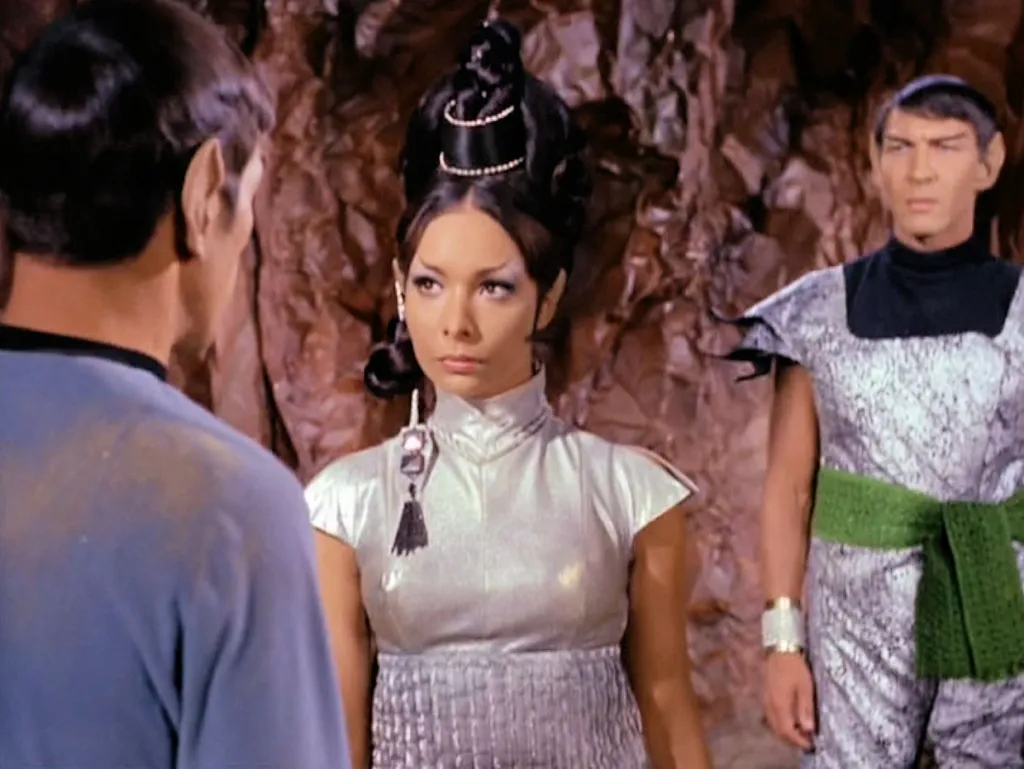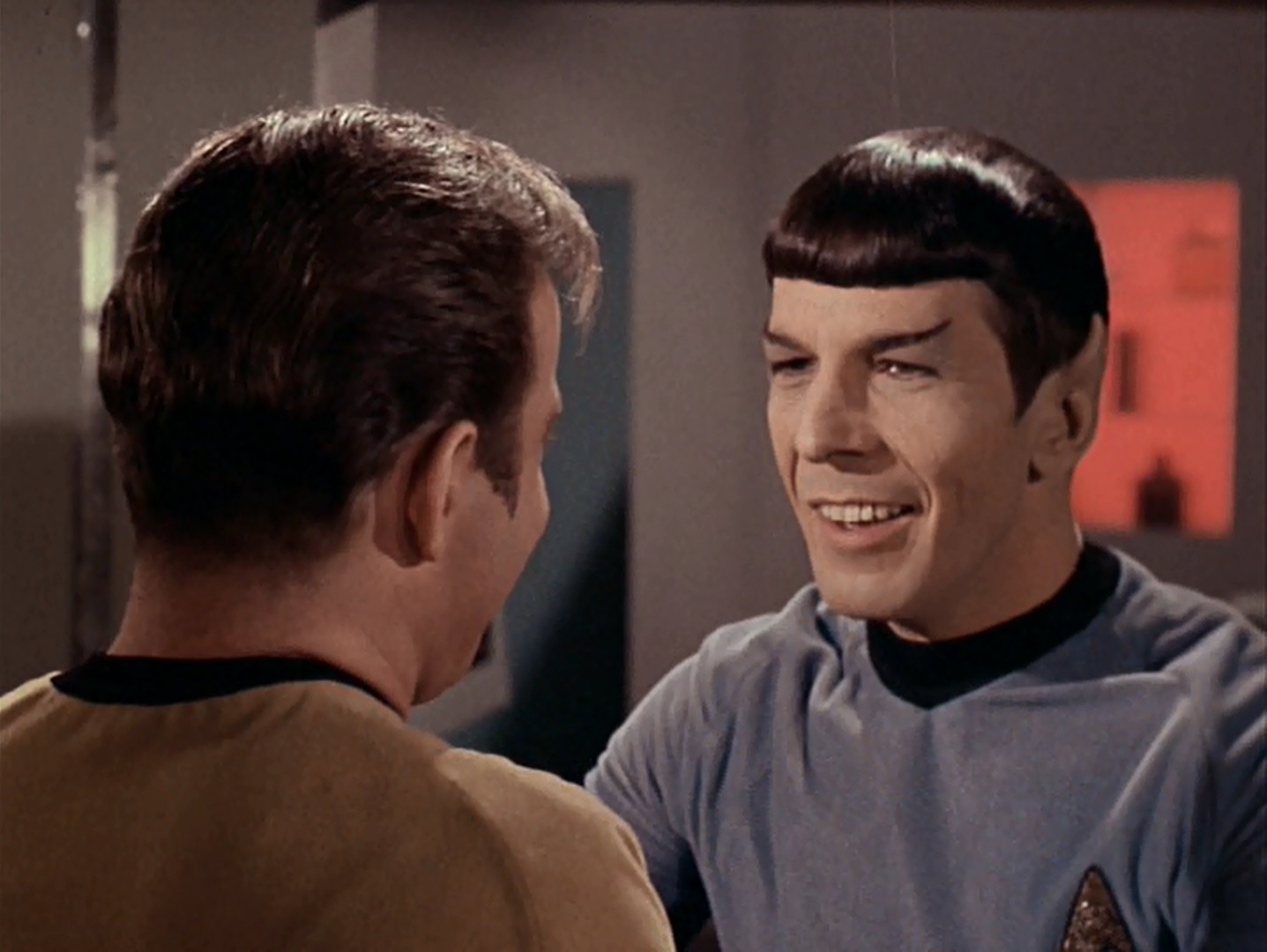
by Tam Phan (Secret Asian Man)
It’s hard to contain the joy that this episode brings to my heart. I’m a sucker for gangster films, like “Ocean's Eleven” and “Bonnie and Clyde”, but I have to admit, I’m always wary when a film does time travel. Period pieces tend to get things wrong one way or another, but “A Piece of the Action” somehow gets it all wrong in exactly the right way. This episode is chock full of amusing interactions that will engage you if for no other reason than it being delightfully fun.

Earth-like alien planets with humanoid populations have awkwardly made their way into Star Trek (e.g. "Miri", "A Taste of Armageddon"). This time, we finally get a plausible explanation for one. In this week's episode, the Enterprise is ordered to report to Sigma Iotia II. The spaceship Horizon went missing about 100 years earlier and is suspected to have contaminated the culture of the planet. Kirk, Spock, and McCoy beam down to the planet’s surface to meet with a Mr. Oxmyx to see what they can do about the contamination.

Let the contamination begin!
They are greeted by armed men wielding Tommy guns in an old-fashioned city suspiciously similar to America in the 1920s. Our landing party is escorted to see Oxmyx and discover that the Horizon crew left an old Earth book called “Chicago Mobs of the Twenties” on the planet. It was mentioned that the Iotians are imitative, which would account for their desire, given a blueprint, to emulate our past. It explains the culture and style, but it's clear the mimicry is skin-deep, which makes sense if they only have one book to go on. For example, during their negotiations, Oxmyx haphazardly shoots billiard balls around the table, and in the next scene when the henchmen are playing poker, it’s not any version that I’ve ever seen. It’s convincing until it’s not, but it’s convincing because it’s not.

"Don't tell me how to play Old Maid!"
Kirk interrupts their game to show them fizzbin (a fictitious game in which Kirk improvises the rules). It’s so absurd that he contradicts himself while explaining the rules of the game. Do you want a third Jack or not? Only Kirk knows. While the henchmen are distracted, Spock and McCoy clobber their captors and successfully escape to the radio station. Kirk decides to split off to find Oxmyx and is captured by Krako’s men. Typical.
Krako, Boss of the south side territory, is seen awkwardly throwing darts over his shoulder before Kirk enters, escorted by Krako’s men. He attempts to negotiate a deal with Kirk that would make Krako top Boss. Kirk isn't necessarily opposed; his aims aren't actually that different from that of the Iotians: Each Boss wants to take enough territory to become top Boss and Kirk thinks a unified government is a good idea, too. The difference is method–Kirk wants negotiation to determine the top Boss, not war. The deal falls through, of course. Krako doesn’t seem like the type to negotiate, stating that, “the book tells us how to handle things.”
A wild series of events ultimately gives Koik the perfect excuse to play a hunch. If you can’t beat ‘em, join ‘em. Koik and Spahck don the local garb and comically make their way back over to Krako’s place. The deal is that the Fed is takin’ over and he’s offered a piece of the pie, but little does he know, Koik’s got other plans. They put the bag on all the mob bosses while Krako’s on ice, ya see. Koik shows a small display of power and negotiates a deal to have Oxmyx be the head of the Syndicate with Krako as his lieutenant. The Federation gets a 40% cut.

What happens when you mess with the Federation.
This episode gives us a lighthearted look at the mob and a unique perspective on how an alien species might mimic a culture. Without minor details to guide them, it’s understandable that they wouldn’t know the rules to 9-ball, poker, or darts. Shatner’s Shatnerisms played well in this setting, and it was fantastic to see Spock have every logical reason to not object to Kirk playing a hunch. Not only that, but he gets to deliver the best line in the episode (adapted to title this article). The supporting cast was wonderful, and I’ve got no beef with this episode.
Five stars.
Against the Odds

by Lorelei Marcus
I will be the first to admit that, despite all it accomplishes, Star Trek has some major recurring flaws. Any show, particularly one that presents a world technologically beyond anything we can understand today, requires a modicum of suspension of disbelief. Such suspension becomes tested as increasingly outlandish claims are thrown around by the characters (particularly our beloved Captain Kirk) and such theories become the basis of the solution for an entire episode. Think Kirk divining the original purpose of the Doomsday Machine, or Jack the Ripper's ghost haunting across space-time (seriously THAT'S the most logical explanation for a series of interplanetary murders?) Sometimes the setup itself can destroy one's immersion, like "Miri" beginning with a planet completely identical to Earth. Or maybe it's a contradiction of preestablished rules in the universe that breaks an episode; Kirk seems to conveniently forget about the Federation's noninterference clause in "The Apple" and "Return of the Archons".
"A Piece of the Action" does everything I've mentioned above, but it does it right. I had my doubts when I first saw the preview for this episode. The Tommy guns and pinstripe suits made me expect another time travel jaunt like "City on the Edge of Forever". Instead, the explanation for the 20s gangster background is quite reasonable and SFnal: a hundred years ago the Federation tampered with a preindustrial planet, and the society of that planet has been modeled around the information the Federation left for them, including a textbook on gangs in the twentieth century. How concise and satisfying an explanation! And it also provides reason for why the Federation later implemented the noninterference clause – to avoid situations like this.

Imagine what they might have found if the Horizon had left the Bible…
This is the cue for Kirk, in his cowboy Kirk fashion, to decide that the structure of the society is not up to his personal moral standards and therefore he has the right to change it. Except this time it makes sense. As Kirk explains the episode, the anarchist state of this planet is the Federation's fault, and in this special case the noninterference clause has limited application because they have to fix the damage they've caused.
Even then, they try to minimize contact between the natives and Starfleet's advanced technology to allow the society to progress and mature on its own course. This has the added bonus of leading to some rather amusing fistfights.
Finally, while the solution of the episode does rest on Kirk's hunch, this too is set up in advance. Kirk both consults the ship's computer and Spock to suss out a logical course of action to save the planet. Only when both sources fail to give him answers does he decide to act on instinct instead. And when he finally carries out his plan, it actually makes sense! He manages to unite all of the gangs into a central government by posing as a larger, more threatening authority. All it takes is Shatner's progressively more dramatic Chicago accent.
I couldn't give this episode higher praise. It elegantly evades the pitfalls of Star Trek while also telling an engaging, funny, and science fiction story.
Five stars.
Embracing the Absurd: A Motto

by Andrea Castaneda
Truth be told, I had a difficult time formulating my thoughts for this episode. At first, I wanted to discuss the themes of authoritarianism. Then I was tempted to look at the governmental structures of a “lawless” society. But the more I thought back on the episode, the more I realized I was overthinking it. “A Piece of the Action” had me laughing with delight rather than putting me in deep thought. And perhaps that was the intention: a lighthearted way to play “cops and robbers” through the world of Star Trek. But even if one can peel back the layers, one can glean a simple lesson: when you find yourself standing in absurdity, embrace it.
First and foremost, I have to commend the writers for playing to Shatner’s strengths. From the comically over the top accent to donning a pinstripe suit, you could tell Shatner was having a gas the entire time. If I were a betting woman, I would wager good money that he was bouncing up and down in his chair as he read the script. Spock, meanwhile, did an excellent job at playing the “straight man” to Kirk’s ostentatiousness. His rigid and awkward attempts at playing a mobster not only highlighted how ridiculous the situation was, but also gave us some great deadpan deliveries.
As for the story itself, well, we’ve established how absurd the premise is. In fact the show explicitly states that there are no logical solutions out of this, shown when Spock goes through his various computer simulations. So, what can the crew of the Enterprise do? The only “logical” thing: outdo the absurdity. And that’s where the episode shines.

"What's the computer suggest, Spock?" "I've…got…zilch."
A mobster henchman foreshadows the concept at the start of the episode, telling Kirk, Spock, and McCoy “that innocent act don’t work on me.” And as predicted, their attempts at peaceful diplomacy only get them into more trouble. But their luck starts to turn when Kirk realizes the mobsters, in all their bluster and moxie, are pretty easy to manipulate. Playing to their sense of stubborn pride, he makes up a card game and flatters them enough to get them to drop their guard. When dealing with the bosses, he learns to come down to their level, framing concepts like taxes into terms they understand. Finally by the end of the episode, Kirk has smooth talked his way into becoming the head honcho of this cartoonish cabal of bosses and wise guys. It’s ludicrous, but still plausible enough to work.
This episode could have very easily become inane, puerile, and flat out stupid. But the self awareness from the writers and actors alike, combined with Shatner’s enthusiasm, gave it a charm that had us laughing along with them the entire way.
If I were one for clichés, I could say that embracing absurdity is a lesson we all can benefit from from time to time. But being realistic, I would say the writers wanted a palate cleanser for what appears to be a much heavier episode next week. We’ll see. In the meantime, I’ll be rummaging through my closet to see if I have anything pinstripe.
Four stars.
Pinch-hitting

by Gideon Marcus
Last week, I noted that the usual show runners had gone AWOL, to the detriment of the episode's quality. This week, I was made trepidatious by the unknown names "David P. Harmon" (writer) and "James Komack" (director). Moreover, the previews had led me to believe that this was going to be another silly time travel episode.

In fact, what we got was not only a thoroughly entertaining second-contact story, but one of the best made episodes of Star Trek we've seen in a while.
The editing and cinematography is some of the crispest and original we've seen to date. There's nary a flat moment, thanks to the quick cutting and innovative camera wrangling. Even the music, which I think was entirely from the library, fit the episode to a "T" – from the lilting strains lifted from "The Trouble with Tribbles" to the bombshell introduction tune from "Mudd's Women".
The director did an excellent job of reining in Mr. Shatner this time around. While many of his favorite tics were on display, they did service in differentiating "Koik the Boss" from "Kirk the Captain." And while Shatner often shone, he did not steal the scene.
Part of that was the snappy writing that put truly funny and effective lines in the mouths of Bones, Spock, and Scotty. Part was the performances Komack elicited from his stars. Even Uhura, though she gets very few lines, is memorable; the smile she gets when she realizes what Kirk has planned for Jojo Krako is just delightful.
Speaking of which, how about those guest stars? Anthony Caruso (Bela Oxymyx) is an old hand, of course, and Vic Tayback, who is everywhere these days, and who does a creditable impression of George C. Scott in The Yellow Rolls Royce, is fantastic as Krako.

George C. Tayback
Finally, the sartorial touch of giving each gang's henchmen different headgear (fedoras for Oxmyx, straw hats for Krako's, bowlers for Tepo's) was brilliant.
Five stars!
This week, the Enterprise will be fighting the paramecium of doom!
Join us tomorrow at 5:00 PM Pacific (8:00 Eastern) or at 8:00 PM Pacific (11:00 Eastern)!

![[January 18, 1968] I Would Advise Yas ta Keep Watching (<i>Star Trek</i>: "A Piece of the Action")](https://i0.wp.com/galacticjourney.org/wordpress/wp-content/uploads/2023/01/680118title.jpg?resize=672%2C372)


![[September 22, 1967] (<i>Star Trek</i>: "Amok Time")](https://i0.wp.com/galacticjourney.org/wordpress/wp-content/uploads/2022/09/670922title.jpg?resize=672%2C372)

















![[March 22, 1967] The Lurking Fear (<i>Star Trek</i>: "The Devil in the Dark")](https://i0.wp.com/galacticjourney.org/wordpress/wp-content/uploads/2022/03/670322title.jpg?resize=672%2C372)














![[February 8, 1967] Hung Jury (<i>Star Trek</i>: "Court Martial")](https://i0.wp.com/galacticjourney.org/wordpress/wp-content/uploads/2022/02/670208title.jpg?resize=672%2C372)

















![[February 2, 1967] It's About Time (<i>Star Trek</i>: "Tomorrow is Yesterday")](https://i0.wp.com/galacticjourney.org/wordpress/wp-content/uploads/2022/01/670202title.jpg?resize=672%2C372)














![[January 26, 1967] Cold-blooded murder (<i>Star Trek</i>: "Arena")](https://i0.wp.com/galacticjourney.org/wordpress/wp-content/uploads/2022/01/670126title.jpg?resize=672%2C372)
















![[January 12, 1967] Most illogical (<i>Star Trek</i>: "The Galileo Seven")](https://i0.wp.com/galacticjourney.org/wordpress/wp-content/uploads/2022/01/670112title.jpg?resize=672%2C372)











![[December 24, 1966] Unquiet on the Romulan Front (<i>Star Trek</i>: "Balance of Terror")](https://i0.wp.com/galacticjourney.org/wordpress/wp-content/uploads/2021/12/661224title.jpg?resize=672%2C372)









